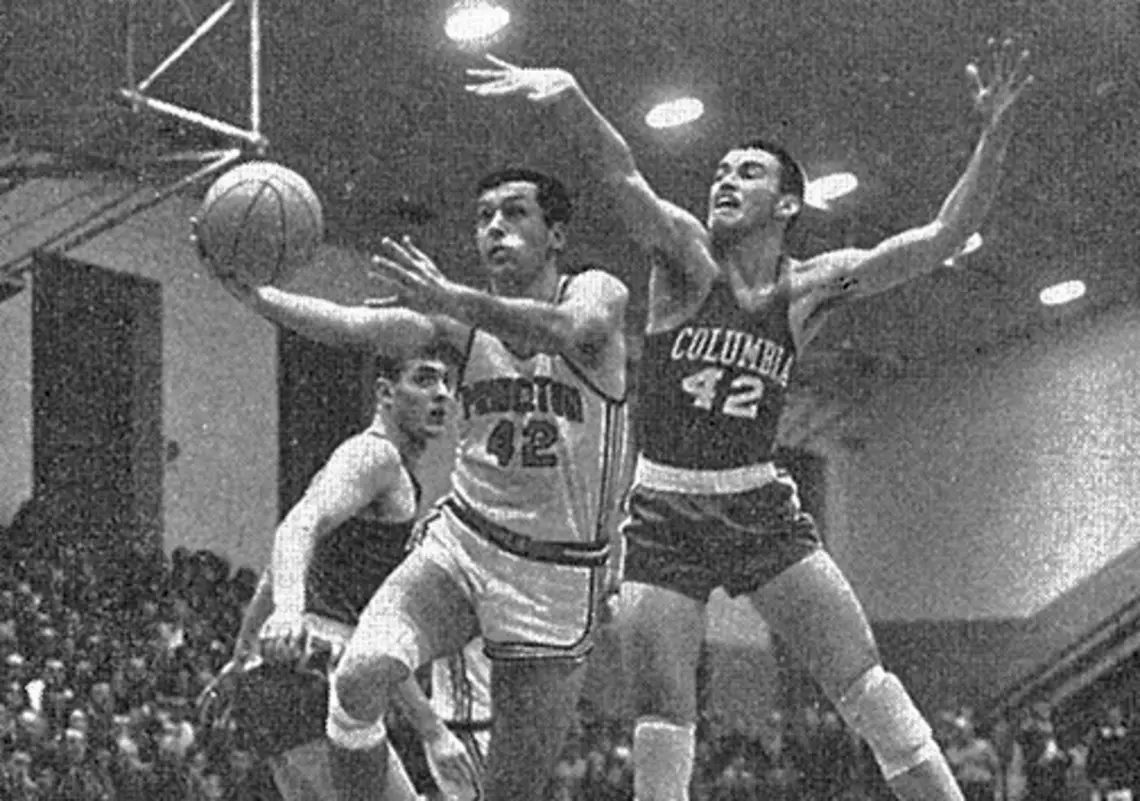
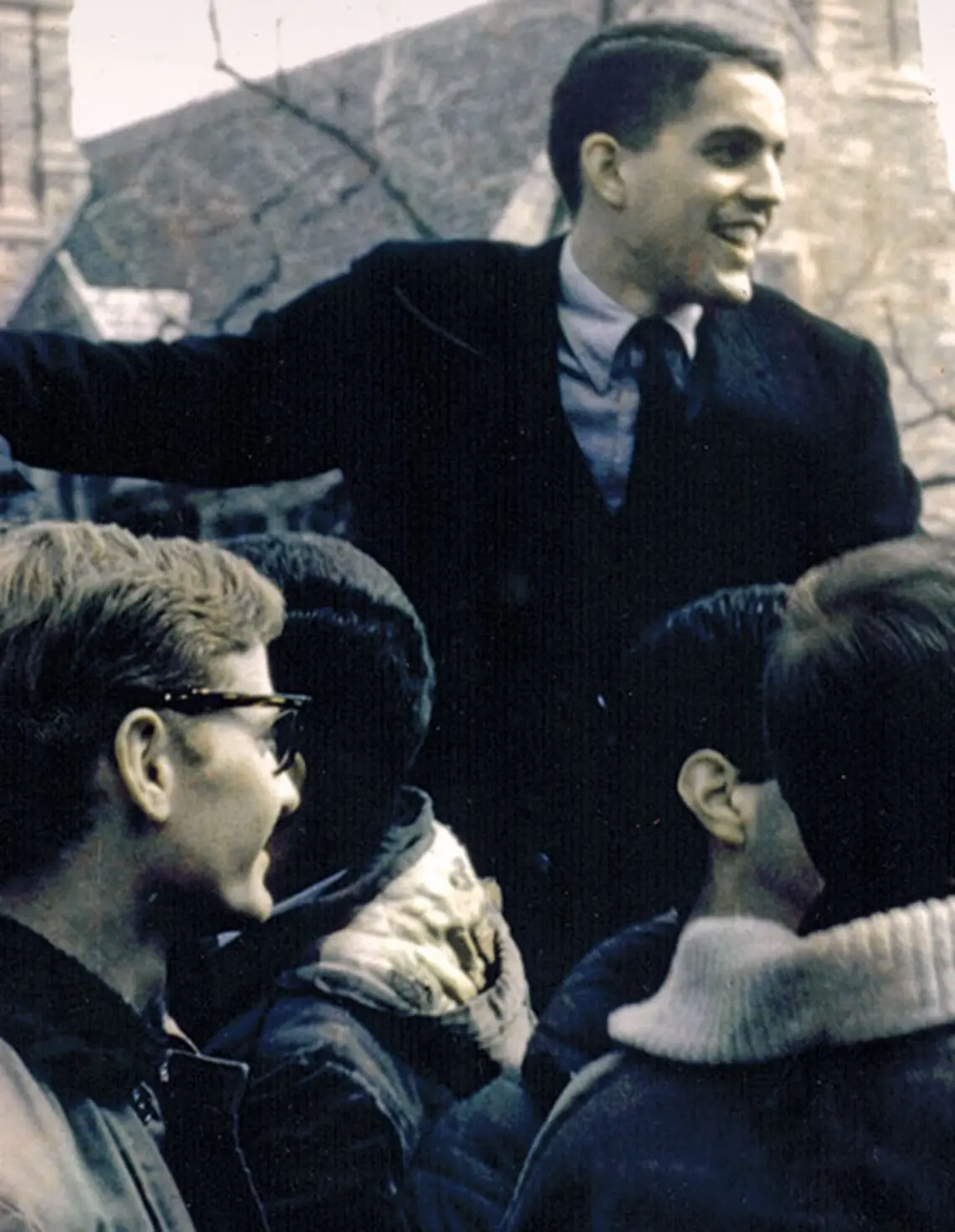
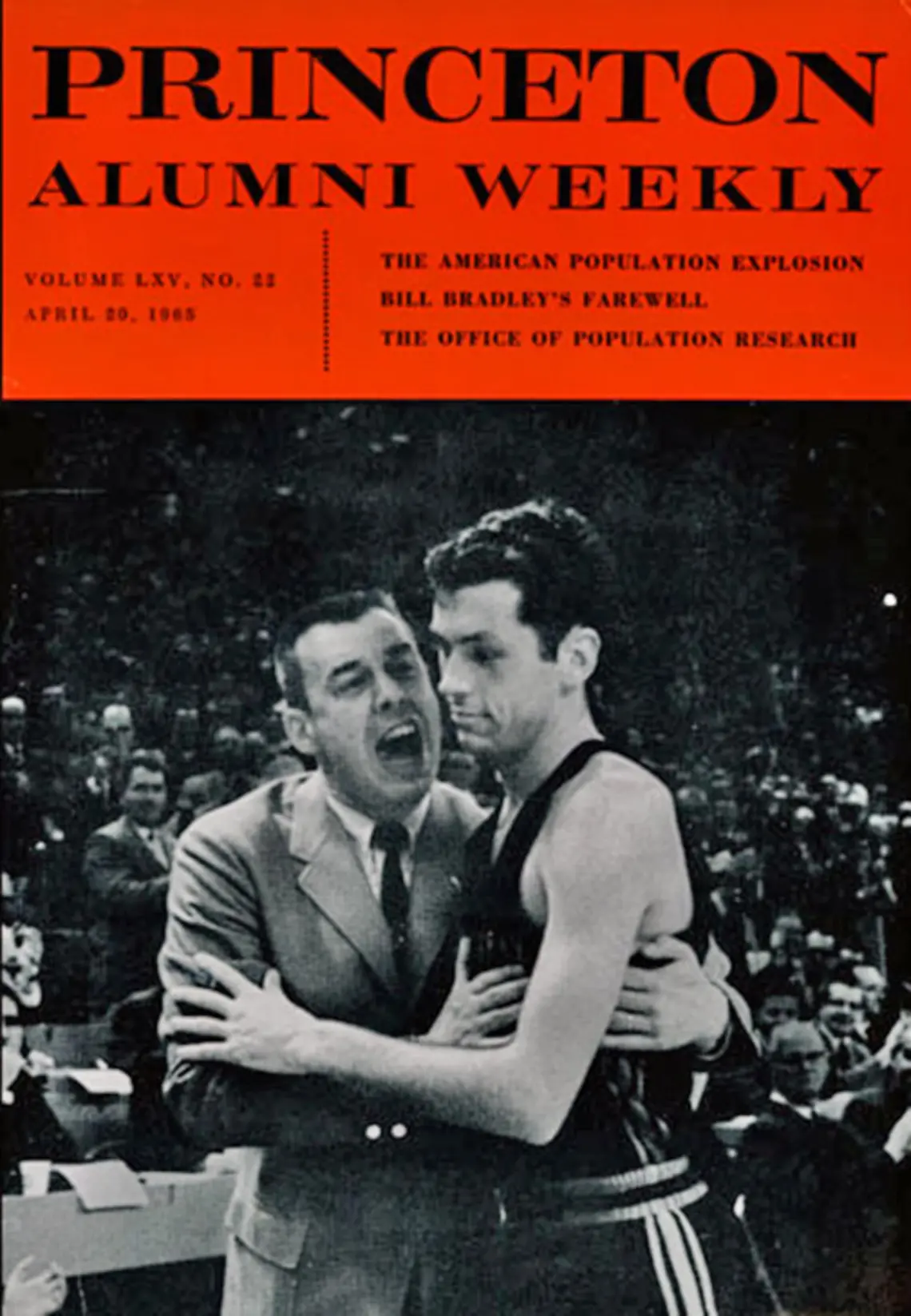
Five members of the 1964-65 Princeton men’s basketball team — Bill Bradley ’65, Ed Hummer ’67, Bill Kingston ’65, Don Roth ’65, and Gary Walters ’67 — share their memories of the Tigers’ run to the NCAA semifinals.
PAW Tracks is also available on iTunes — click here to subscribe
TRANSCRIPT:
Last time on PAW Tracks, members of Princeton’s 1965 Final Four basketball team spoke about some of the things that made the Tigers successful. In this episode, we cover the team’s run to the NCAA semifinals.
In reality, the team’s fortunes began to change four years earlier when Bill Bradley, a high-school phenom, made a last-minute decision to attend Princeton, instead of Duke.
Bill Bradley ’65: When I changed from Duke and came to Princeton, the premise was that a group of student-athletes could compete against the very best. And when we won the East and went on to the Final Four, to me that was a confirmation of everything that I had hoped for. Of course, I had hoped to win the championship.
Before Bradley’s arrival, Princeton had reached the NCAA Tournament four times but only won one game. Its emergence as a national power would have seemed far-fetched to just about anyone – anyone except Bradley.
Bradley: I didn’t know better. And I assumed it was going to happen, and I spent all my time trying to be the best I could be and then help recruit the talent that we finally had in my senior year, and it proved to be enormously rewarding for everybody.
The Tigers’ run to the 1965 NCAA semifinals began against Penn State at the Palestra. Ed Hummer, a sophomore on the team, recalled that night.
Ed Hummer ’67: I’ve often joked we owe all of that whole experience, all the sort of storied quality of that team, to Don Rodenbach [’66]’s left foot.
Bobby Weiss, the Penn State guard who later played in the NBA, is taking the ball out of bounds, and he’s going to throw it to his fellow guard. And Don Rodenbach is guarding him. So [Weiss’s teammate] has this bright idea that he’s going to spin and twirl off to his left and just shake Don and go back. But as he tries to spin, his left foot hits Don’s left foot. Not a trip, just toe to toe. And it’s one of those freak things: Just at that moment Bobby Weiss is releasing the pass, right to what would be [his teammate’s] left hand. And as he goes down, it turns out to be a perfect one-hop bounce pass to Don, going in to make the layup that puts us up [by six]. It was clearly the key play of the game, a game that could have gone either way.
That’s what tournaments are like. People forget those little moments. When you get those great moments later, they forget the little moment that could have made it all nonexistent.
Point guard Gary Walters
Gary Walters ’67: To a person, that really bred confidence in us because we did not play well [but still won]. So now we’re going to the Eastern Regionals, and North Carolina State won the ACC tournament — they had a very good team. And we now come out and we really play up to our potential. While Bill was no surprise to anybody, I think the overall play of the team surprised everybody.
Princeton beat North Carolina State 64-48 in the first Eastern Regional semifinal. The second game pitted two of the nation’s top teams: No. 4 Providence and No. 3 St. Joseph’s. The Princeton players stayed to watch.
Walters: It was an incredibly intense game, with two great teams going at it. And you had to feel sorry for the loser. But Providence wins and in a burst of just emotion, I guess — certainly wasn’t well thought-out action — they cut down the nets. We’re sitting right there in the stands behind the basket. Well, to put it mildly, it was a breach of protocol, and if you really want to look at it even more so, it was definitely an insult to us. So we were motivated. We were motivated.
Providence was 24-1 with a roster that included three future NBA players, but Princeton ran its offense to near-perfection, taking a 13-point lead before halftime. Here’s Don Roth, a senior on the team.
Don Roth ’65: One of the things that really struck me in our senior year was the halftime talks that Coach [Butch] Van Breda Kolff [’45] used to give. He was an extremely strong personality — a really excitable guy. You’d come down for the halftime, and in less than five minutes, he’d be angry, sad, resolute, funny, mad. Up and down like a yo-yo! It was just terrific stuff.
Against Providence, Van Breda Kolff took a different approach.
Roth: He gets in there, puts his finger up like he’s going to start with one of the usual lectures. And all of a sudden he just starts laughing. We were all kind of shocked — we’re ahead of these guys. And you know, it was a pretty short speech that halftime. “Come on guys, keep at it, let’s take these guys.” We really just blew them out in the second half.
Reserve guard Bill Kingston
Bill Kingston ’65: I sat there as the lead grew, trying to prepare myself to go in, knowing that this couldn’t go on like this too much longer. And when it started to turn, maybe I’d be asked to go in the game. So I was looking at it from that standpoint, and the next thing I knew, the game was out of reach, and we ended up winning by 40 points.
Walters: Frank Deford [’61] wrote an article in Sports Illustrated on the win. The title of his article was, “A Whole Team Touched By Stardust.” A lot of that was true in as much as Bill was such a versatile and great player, but also what happened is the development of the sophomores was such that we were now what we thought we could be at the beginning of the year. And clearly, Providence wasn’t in the state of mind at all to expect us to play that way.
Bradley: For me it was one of the best team games I ever played in — high school, college, or pro.

When Princeton returned to campus, students and fans met the buses for an impromptu celebration. A few days later, the team boarded a plane to Portland, Ore., to face Michigan in the national semifinals.
Hummer: They didn’t even call it the Final Four then. It was just the national semifinals and then the national finals. But the most incredible thing is, you’re one of only four teams still playing. Everybody else is done. Everybody. And you’re still playing. It’s like on the playground, you know. You “got next,” and there’s only four teams standing. That’s a very strange experience.
Roth: You forget the bumps and bruises and the grind of playing day in, day out, week in, week out. You forget the scores of the games and indeed, even what teams you played. But you do remember playing in the Final Four. And that memory stays with you.
Princeton had nearly beaten Michigan in December at Madison Square Garden, surrendering the lead in the final minutes after Bradley had fouled out. In the rematch, foul trouble again plagued the Tigers, who stayed close in the first half before falling 93-76.
Walters: The whistles were fast and furious, and it didn’t seem right. I mean, we didn’t have a chance to play. And we were ready to play. It’s not like we weren’t ready.
Hummer: The last five or six minutes, we looked like an Ivy League team. Michigan was incredibly, physically strong — more like players today than they were then. Oliver Darden, Bill Buntin, Cazzie Russell — their front line was incredibly, physically strong. And Butch, he would always bemoan the fact that we were not that strong.
It’s the kind of a game that’s just depressing because you wilt down the stretch, because the other team is just stronger. It was very depressing to lose that game.
The Tigers would have one more chance to play, in the consolation game against Wichita State, and the team planned to make it a memorable night for Bradley.
Roth: He averaged maybe 30 points a game all three years. And he never really shot a lot, certainly didn’t hog the ball. So everybody just decided, Bill didn’t have a choice. Nobody was going to shoot — we were making him shoot. And of course he was a great shooter.
Bradley: They’d pass it to me, somebody has a better shot, I’d pass it to them, and strangely it started coming back to me. And I’d throw it back. Van Breda Kolff called a time out, and said, “Bradley, shoot the damn ball, this is your last game.” And so I did.
Hummer: Everybody was looking to Bill, but it was done pretty subtly. I mean, the ball still moved. But it just found its way to Bill. And he’s taking a bunch of quick shots and they’re all going in. And he gets some layups and they all go in.
I think he had a hook shot — I haven’t seen it on film, but I have it in my memory is, the ball went to Bill in the corner. Maybe not the dead corner by the sideline, but not far from it. And he’s got a guy in front of him, and a guy comes up to double-team him. So he’s now double-teamed, and he just goes back and shoots a hook shot. Swishes it. I don’t know what those guys must have thought. It’s like, what the hell? What else could we possibly do?
Bradley made 22 of 29 field goals and 14 of 15 free throws for 58 points, still a Final Four record.
Bradley: Somebody sent me the stat sheet of that game, which I hadn’t seen in 40 years, about two years ago. And I look at it and say, gee that was me?
Kingston: For us, our last game was a statement. We only won third place but Bill had 58 points, the team had 118. It was as good a way to end the season as you could have without actually winning the national championship.
Hummer: One of the great things about sports — I think it’s one of the best things about sports, actually; it’s why people care about it so much — is how unforgiving it is. You don’t get medals just for showing up. And the bounce of the ball, Don Rodenbach’s left foot, can determine a lot.
The 1965 Final Four team will be honored on campus March 7, when Princeton men’s basketball hosts Columbia in the final home game of the season.
Paw in print
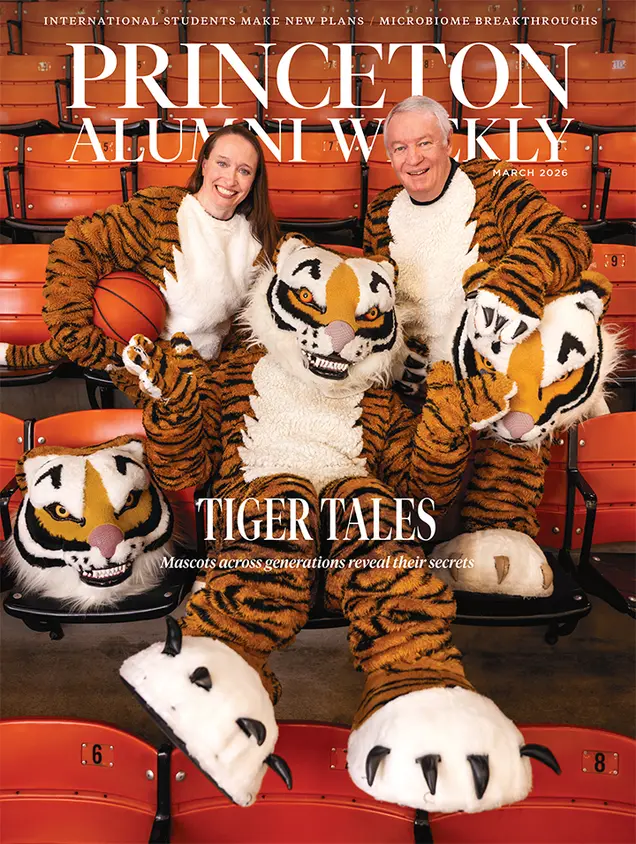
March 2026
Mascots across generations; biome breakthroughs; international students make new plans.


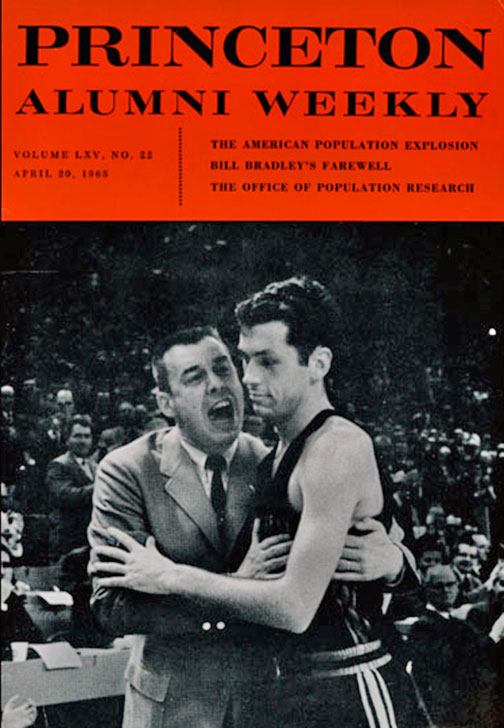
No responses yet